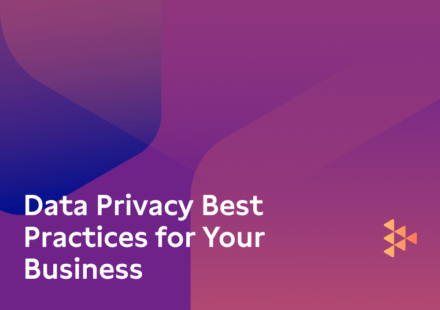Data privacy best practices should be a cornerstone of every business’s go-to-market strategy in today’s digital age. With the increasing amount of personal and financial information being shared online, it’s more important than ever to ensure that your company is taking steps to protect the sensitive data you handle and investing in cybersecurity measures.
In this blog post, we’ll discuss some of the basic data privacy protections you should implement if you haven’t already to improve your security and privacy posture:
- How to create a privacy policy
- Security awareness training
- Penetration testing
- Continuous monitoring
Document Your Processes With Policies
Policies and procedures are the foundation of any information security program. They help to set the baseline for your infosec program with clear frameworks and guidance for you and your team.
Not sure where to start when developing your company’s privacy policies? Start with these simple steps:
Identify the types of data you collect.
Types of personal information you handle could include:
- Personal identification information: This includes information like names, addresses, and social security numbers. GDPR is an EU data privacy law that governs how companies are to protect EU citizens’ data, and Canada has a similar privacy law called PIPEDA.
- Financial information: This includes payment card numbers, bank account numbers, and other financial details. PCI DSS provides guidance and controls for meeting security requirements for financial information.
- Health information: This includes medical records and other personal health information. Look to HIPAA, the U.S. privacy law, for the controls and requirements governing health information.
- Intellectual property: This includes copyrighted materials, trademarks, and trade secrets.
- Customer data: This includes information about your customers, such as their purchase history and preferences. SOC 2 is the security framework of choice in North America for information on protecting data. ISO 27001 is the international standard, similar to SOC 2, that provides a comprehensive set of controls and requirements for data protection.
It’s important to protect all of these types of data, as they can all be valuable to malicious hackers and, if compromised, could be used to harm your business or your customers. Each of these types of data has its own set of risks and respective security frameworks to address these risks. The frameworks are designed to meet the unique controls and requirements to optimize your company’s privacy.
Explain how you use this information and why you need it
Data privacy best practices will always mandate collecting and maintaining the least amount of data necessary for your business to function. Understanding why you collect the data you do and how you will use it is essential to follow this best practice and should be comprehensively discussed in your privacy policies.
For example, you might use a customer’s email address to send them promotional emails or a payment card number to process their order.
You should also include the processes you follow to destroy data that you no longer use or that a customer has requested to be removed from your company’s systems.
Outline the security controls you have in place
Make sure your privacy policies include the many ways you and your company keep your data secure. This can include:
- Implementing strong passwords
- Using multi-factor authentication (MFA)
- Regularly updating your software and systems to ensure that they are secure.
- Using encryption to protect sensitive data
Prioritize your customer’s right to opt-in and out
Finally, be sure to discuss how your customers can access and update their personal information, as well as how they can opt-out of certain types of data collection.
Give Your Team a Leg-up With Security Awareness Training
One of the best ways to protect your business’s data is by educating your employees about data privacy and security with comprehensive security awareness training. It involves teaching your employees about the importance of data privacy, as well as how to protect sensitive information.
Security and privacy awareness training is integral to a sustainable program. No matter how well documented or correct your policies and procedures are, if you don’t also ensure that your team has internalized security best practices, you are putting your organization at risk.
Robust training programs might include topics like creating strong passwords, identifying phishing scams, and spotting suspicious activity. By ensuring that your employees are knowledgeable about data privacy, you can reduce the risk of a data breach caused by human error.
Leverage Ethical Hacking Tools
Ethical hacking, also known as “white hat” hacking or penetration testing, is a tool used to identify and fix potential security issues within a company’s systems before malicious hackers exploit them. Ethical hackers are security professionals who use their skills to find vulnerabilities and weaknesses and recommend fixes to address them. By proactively testing the security of your systems, you can reduce the risk of a data breach and protect the personal information of your customers and employees.
Maintain Compliance With Continuous Monitoring
Continuous monitoring is a crucial component of any organization’s risk management program. By automating the process of assessing and monitoring your systems, you can make effective risk-based decisions based on the specific, measurable, and actionable information provided and quickly respond to identified risks.
The frequency of monitoring should be enough to ensure that risks are identified and addressed promptly. This proactive approach to data privacy significantly reduces the impact of cyber-attacks and data breaches on the company and its customers.
Multiple security frameworks require continuous monitoring for compliance. For example, the National Institute of Standards and Technology (NIST) provides guidelines for continuous monitoring in its NIST 800-53 publication, and the Federal Risk and Authorization Management Program (FedRAMP) mandates continuous monitoring as part of its security assessment and authorization process for cloud service providers.
By adopting continuous monitoring as a best practice for data privacy, companies can ensure they are meeting the requirements of these frameworks and protecting their customers’ sensitive information.
Next Steps: Carbide is Your Co-Pilot on Your Data Privacy Journey
We streamline the process of goal and task management with our automated platform and expert human guidance. Our solution provides a comprehensive view of your security and privacy posture, enabling you to execute a reliable strategy.
We take care of the scoping and automate evidence collection using our 100+ technical integrations. Additionally, we produce a detailed security report that is crucial for decision-making and stakeholder communication. With Carbide, you can focus on growing your business without compromising security, privacy, or compliance.
Here are two ways to begin:
- Book a demo with our team to learn more.
- Share this blog post if you found it helpful via LinkedIn or Twitter.

